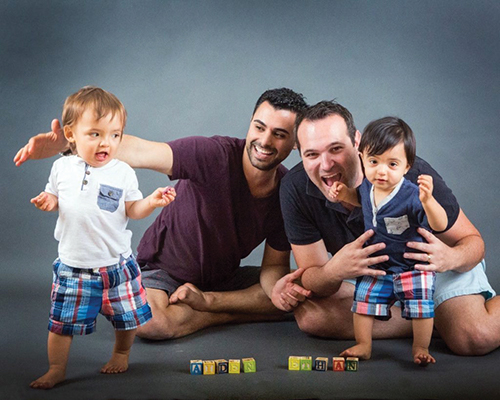Did you ever imagine that a child can be a U.S. citizen at birth, but his twin brother cannot? We asked this question last year when we analyzed the court cases of two sets of twins who were facing this very legal dilemma. Earlier this year we celebrated the victory of one of the twins when a federal judge ruled he was a U.S. citizen at birth, just like his twin brother. Unfortunately, the Trump administration appealed that decision, and the uncertainty of the children’s legal status, along with the hardship their families must endure as a result, continues.
As you may recall from our original article from March 2018, Andrew Dvash-Banks, a U.S. citizen, and his husband, Elad Dvash-Banks, an Israeli citizen, were legally married in Canada in 2010. In 2015 they both used their own sperm and eggs from an anonymous donor, which led to a successful twin pregnancy carried to term by a surrogate. The twins, Ethan and Aiden, were born minutes apart in 2016, in Canada. Andrew and Elad are the only parents listed on the children’s birth certificate, and they are the children’s legal parents.
However, when Andrew and Elad tried to register the U.S. citizenship of the twins with the U.S. Consulate in Canada based on having a legal U.S. citizen parent, the Consulate required DNA testing to ascertain which parent donated the sperm for which twin. As a result of the testing, the U.S. Consulate denied U.S. citizenship to Ethan because he was Elad’s biological son. The Consulate granted U.S. citizenship to Aiden, Andrew’s biological son.
Across the Atlantic, Alisson Blixt, a U.S. citizen, and her wife, Stefania Zaccari, an Italian citizen, were experiencing the same horror at the U.S. Consulate in London. Alisson gave birth to Massi and Stefania gave birth to Lucas. The couple was married at the time the boys were born and they are the only parents listed on the birth certificates. Massi was granted citizenship at birth, but Lucas was not.
In both cases, the U.S. Consulates based their decision on the wrong interpretation that the Immigration and Nationality Act (INA) requires a blood relationship between the child and the U.S. parent for the child to derive U.S. citizenship at birth. In reality, the law requires no such thing for Ethan and Lucas. Section 301(g) of the INA states that a person born outside of the U.S. of a parent who is a U.S. citizen and one who is not, automatically derives citizenship at birth if the U.S. citizen parent was physically present in the U.S. for at least five years prior to the child’s birth, at least two of which being after the parent’s fourteenth birthday. It defines the term “parent” as a relationship that exists when a child is born in wedlock, among other situations.
The INA, specifically Section 309 of the Act, does require a blood relationship for children born to a U.S. citizen father out of wedlock. But both Ethan and Lucas were born in wedlock, so they fall under the purview of Section 301, not 309. Nothing in the INA requires a blood relationship for children born to a couple that is already married.
Given the blatant misinterpretation of law, both families sued the U.S. government in federal court seeking to obtain automatic citizenship for Ethan and Lucas. The two cases are Dvash-Banks v. Tillerson in the U.S. District Court for the Central District of California (Case No. 18-CV-523), and Blixt v. Tillerson in the U.S. District Court for the District of Columbia (Case No. 18-CV-124). Ethan’s case in California was decided first.
On February 21, 2019, a federal judge granted the Dvash-Banks family’s Motion and agreed that Ethan was a U.S. citizen at birth under INA Section 301, which only requires a legal relationship to the U.S. citizen parent, not a biological one. The judge agreed that, had Congress intended to require a blood relationship for children born to married couples, it would have spelled that out in Section 301, just like it did in Section 309 for children born out of wedlock. The court entered judgment in Ethan’s favor on March 6, 2019.
Unfortunately, the Dvash-Banks family’s journey did not end here. On May 6, 2019, the Trump administration appealed in an attempt to strip Ethan of U.S. citizenship. The parties will next submit their respective legal briefs, and months will go by before the Ninth Circuit Court of Appeals will decide this matter.
There is no way to predict with absolute certainty how the Court will decide this case, but legal precedent from the Ninth Circuit seems to be on Ethan’s side. That court analyzed INA Section 301 twice before, albeit not in the context of same-sex couples or births stemming from assisted reproductive treatment, and found both times that Section 301 does not require a biological relationship to the legal U.S. parent in Scales v. INS, (9th Cir. 2000), and Solis-Espinosa v. Gonzales, (9th Cir. 2005). We will now wait to see if the Ninth Circuit remains true to its own legal precedent.
In the meantime in D.C., the Blixt-Zaccari family continues to fight their battle in district court, as a final judgment has not yet been entered for Lucas. In that case, the government filed a Motion to Dismiss the case in September 2018. If granted, that would mean that Lucas is not a U.S. citizen. Remarkably, the government spent very little time addressing the actual law in its motion. Instead, it relied almost exclusively on language from the Foreign Affairs Manual, the agency’s practice manual, which would require a blood relationship for Lucas. However, the Foreign Affairs Manual is not law and, most importantly, is not above the law.
While the government’s Motion to Dismiss was still pending in the Blixt-Zaccari case, a federal judge in California ruled in Ethan’s favor in the Dvash-Banks case. As a result, the judge in the Blixt-Zaccari case requested supplemental legal briefs to address the effects of the Dvash-Banks case. On May 15, 2019, the D.C. federal judge denied the government’s motion to dismiss, meaning that Lucas can proceed with his federal case, in hopes that he will obtain the same result as Ethan did in California.
We will continue to keep track of these important cases and continue to fight for equality. If you have any questions about immigration or family law, please feel free to contact us.























0 Comments